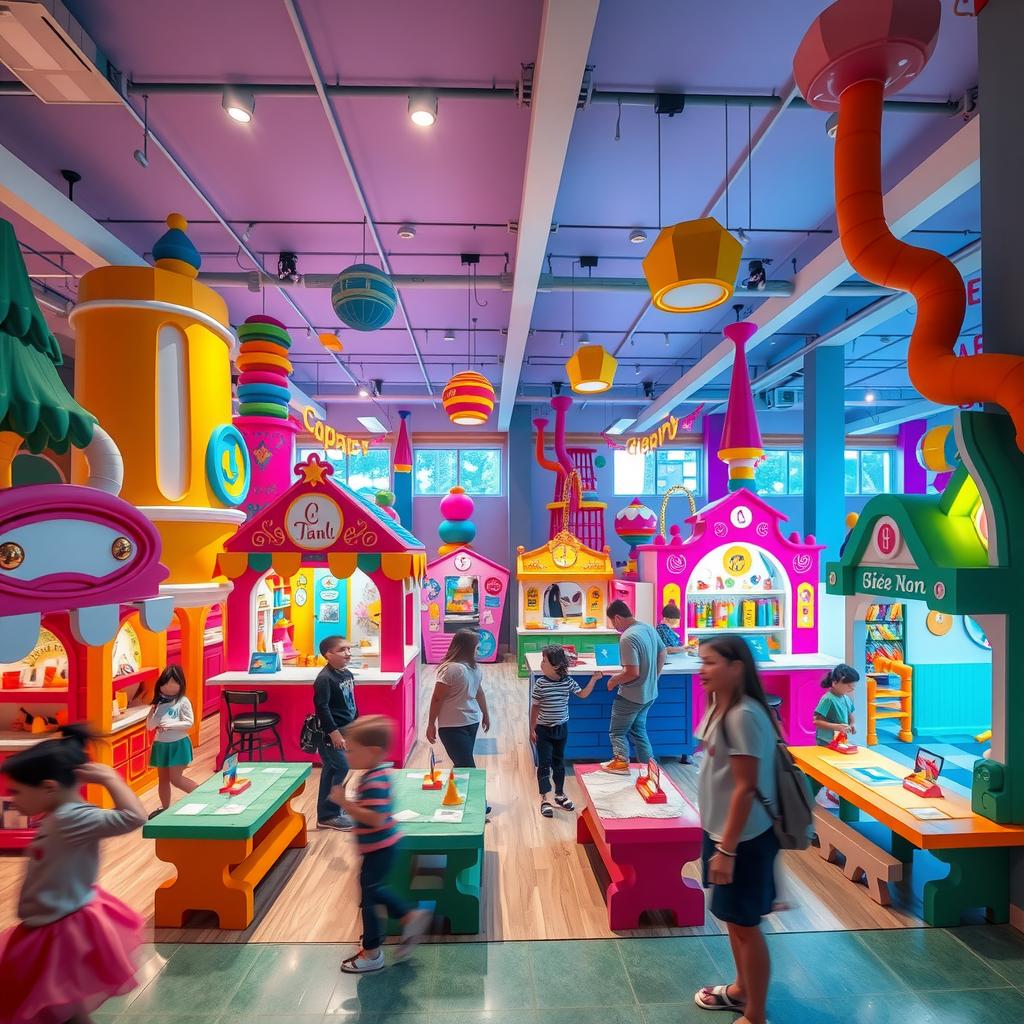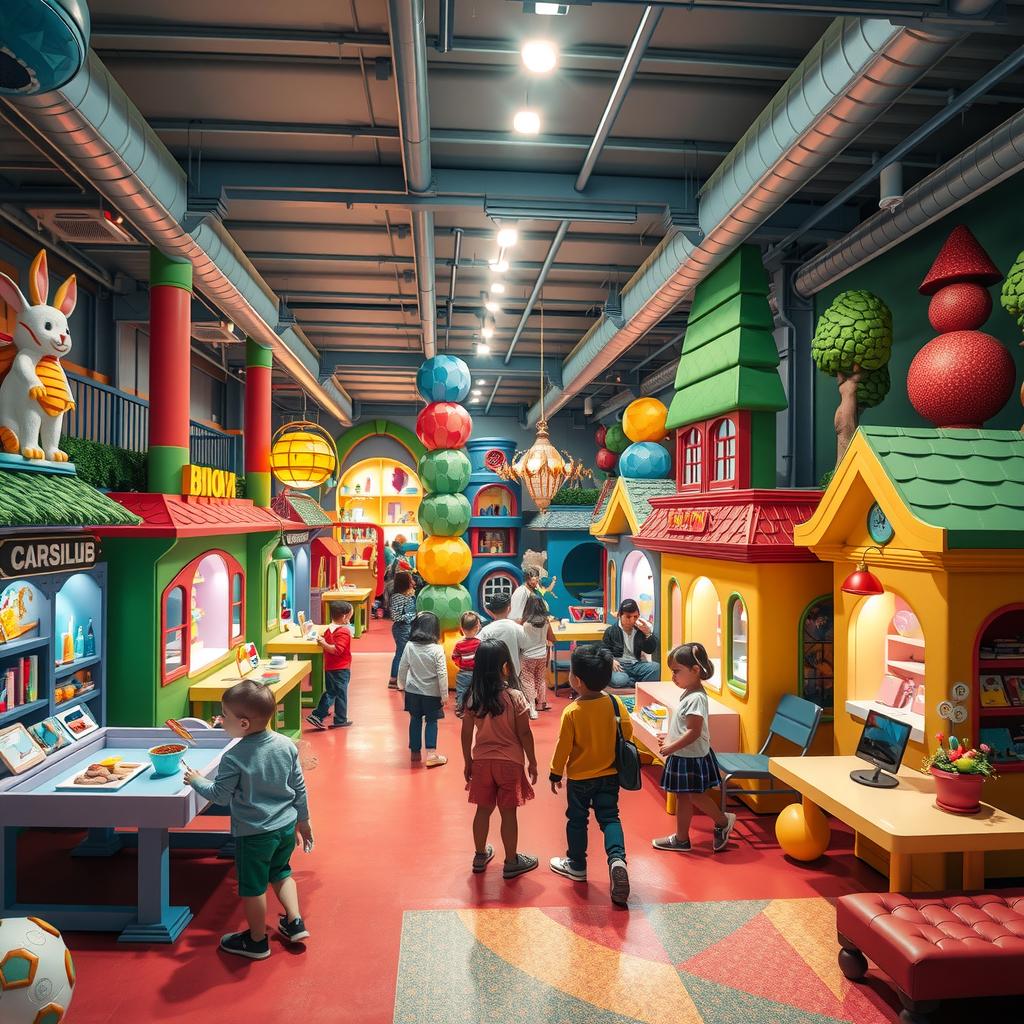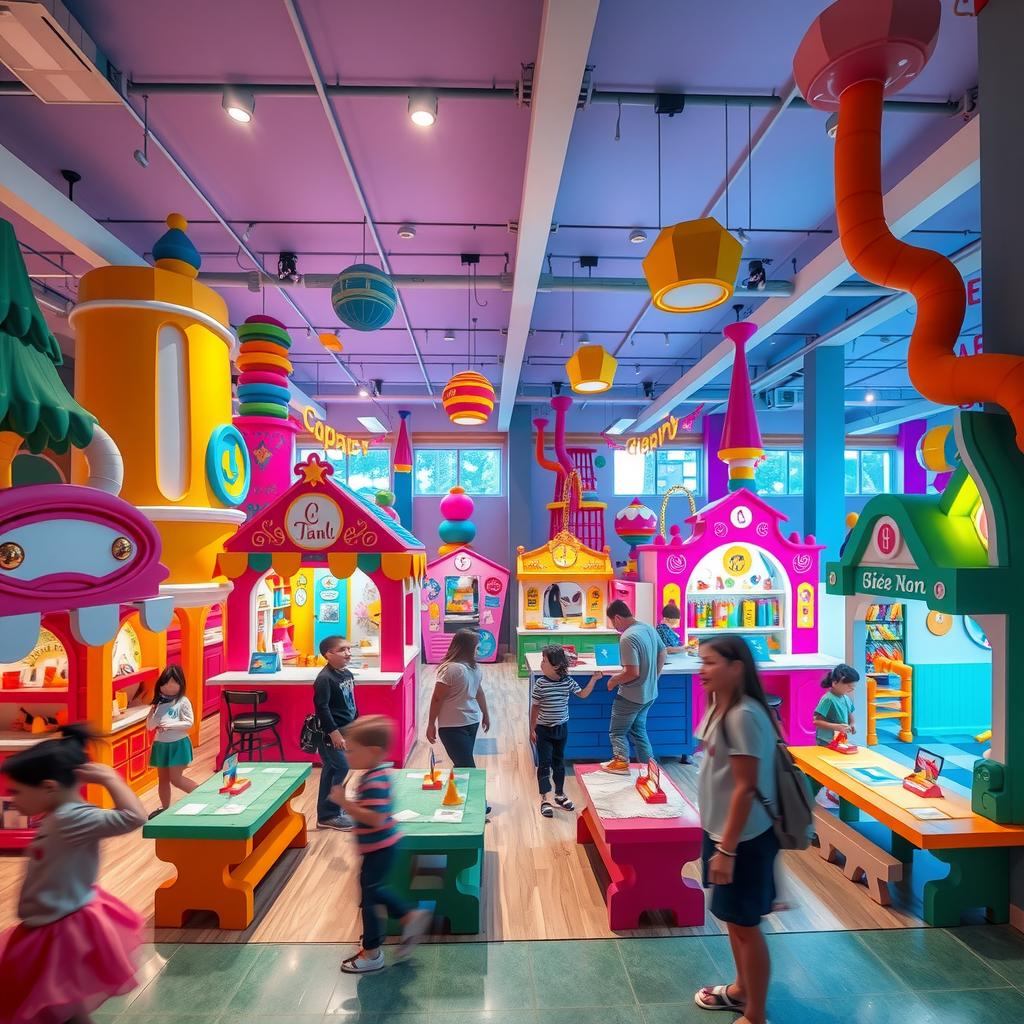In an era where screen time often overshadows hands-on play, how can indoor playgrounds transform into vibrant spaces that foster creative exploration? The answer lies in the implementation of role-play stations, which not only captivate children’s imaginations but also serve as invaluable tools for their child development. These interactive setups offer more than just a space to play; they create immersive environments where children can engage in imaginative scenarios, enhancing their social skills and promoting educational play. By incorporating thoughtfully designed role-play areas within an indoor playground, caregivers and educators can provide unique opportunities for kids to engage in interactive learning.
As children step into these engaging activities, they are encouraged to experiment with different roles—whether it’s pretending to be a doctor in a mini clinic or taking charge as the captain of a pirate ship. Such experiences stimulate their creativity while simultaneously teaching them about collaboration and communication with peers. In this way, role-play stations not only enrich the play environment, but also lay the groundwork for essential life skills through fun and dynamic interactions.
The beauty of integrating these imaginative setups is that they cater to various age groups and interests. With diverse themes ranging from marketplace simulations to adventure quests, each station invites children to dive deep into worlds limited only by their imagination. Moreover, when parents or guardians participate alongside them, it creates stronger bonds through shared experiences—making every visit both memorable and enriching.
This blog post will delve into effective strategies for setting up these captivating role-play stations within indoor playgrounds. By exploring key factors such as space design, thematic elements, safety considerations, and tips for maximizing engagement among young participants, readers will discover how easy it is to cultivate an atmosphere rich in creative play. Join us as we uncover practical insights that aim to inspire change in any indoor recreational setting!

Key Points:
-
Dynamic Role-Play Stations: Transforming Indoor Playgrounds into Creative Hubs
The strategic design of role-play stations within an indoor playground can significantly enhance children’s engagement and imagination. By incorporating various themed environments, such as marketplaces or adventurous settings, children are encouraged to dive into scenarios that promote both fun and learning. This immersive experience not only captivates their attention but also nurtures essential skills through engaging activities. -
Fostering Child Development through Interactive Learning:
As children participate in imaginative role-play, they naturally develop a range of cognitive abilities. These experiences allow them to explore different roles while promoting empathy and understanding among peers. The carefully curated play environment supports individual growth as well as collaboration, helping children navigate group dynamics effectively—essential for developing vital communication skills. -
Enhancing Social Skills with Educational Play Opportunities:
The incorporation of thoughtfully designed role-play stations encourages teamwork and problem-solving aptitudes among young learners. In these vibrant spaces, kids engage in collaborative projects that stimulate their creativity while reinforcing social interactions. Ultimately, this type of interactive learning transforms every visit to the indoor playground into a rich educational experience where lifelong skills are cultivated through playful exploration.

Transforming Play Spaces with Role-Play Stations
Unlocking Potential Through Imaginative Engagement
Role-play stations represent a pivotal advancement in the design of indoor playgrounds, offering children immersive environments that foster their development through engaging activities. These specialized areas encourage creative play by allowing children to assume various roles, from doctors and chefs to superheroes and explorers. This imaginative engagement not only entertains but also serves as an essential tool for enhancing children’s social skills, emotional intelligence, and cognitive abilities. As they interact within these dynamic settings, young learners experience hands-on opportunities for interactive learning, which are crucial in shaping their personalities and understanding of the world around them. By participating in scenarios that require negotiation, collaboration, and problem-solving, children develop important life skills while having fun.
The Educational Value of Role-Play
Encouraging Growth Through Interactive Scenarios
Incorporating role-play stations into indoor playgrounds is more than just a trend; it reflects a deeper understanding of how play contributes to child development. Each station can be tailored with themes that resonate with children’s experiences or aspirations—be it a grocery store setup or an astronaut’s space hub—making the play environment both familiar and stimulating. Such setups facilitate educational play, where learning becomes organic rather than forced. Children engage critically with educational concepts such as counting money during checkout or utilizing vocabulary relevant to their chosen role. These interactions ignite curiosity about different professions or cultures while simultaneously reinforcing foundational academic skills in math and language arts through practical application.
Fostering Social Connections Among Peers
Building Relationships Through Shared Experiences
One of the most significant benefits of role-play stations is their capacity to enhance peer relationships among children. When engaged in collaborative tasks within these spaces, kids learn how to communicate effectively, share ideas, negotiate solutions, and resolve conflicts—all vital components of healthy social interactions. By stepping into another’s shoes during pretend play scenarios—whether acting out family dynamics or navigating community responsibilities—they cultivate empathy towards others’ feelings and perspectives. Such experiences are critical for developing interpersonal skills necessary for future friendships and teamwork later in life.
Promoting Holistic Development
A Comprehensive Approach to Childhood Learning
The integration of role-play stations goes beyond simple entertainment; it addresses multiple facets of growth simultaneously—cognitive development through problem-solving challenges while promoting physical activity via movement around the station setups—and nurturing emotional resilience as children face various outcomes from their playful adventures together. Moreover, this holistic approach aligns seamlessly with early childhood education philosophies emphasizing active participation over passive absorption when it comes to learning processes among young minds! Consequently incorporating well-designed role-play areas transforms ordinary indoor playgrounds into vibrant ecosystems rich with potential for fostering imagination-driven exploration essential for thriving individuals readying themselves confidently toward adulthood.
The Importance of Imaginative Play in Child Development
Discovering the Cognitive Gains Through Creative Engagement
Imaginative play, particularly within structured settings like role-play stations and indoor playgrounds, offers a wealth of cognitive benefits that are crucial for child development. Engaging in such activities allows children to explore their creativity while developing essential problem-solving skills. In these environments, children often take on various roles, which stimulates their imagination and encourages them to think critically about different scenarios. For instance, when they engage in pretend play as doctors or teachers, they learn to navigate complex social interactions and develop a deeper understanding of empathy by putting themselves in someone else’s shoes. This kind of creative play not only enhances their imaginative capabilities but also fosters cognitive flexibility—an important skill that aids academic success later on. Moreover, research indicates that children involved in interactive learning through imaginative role-play tend to exhibit better memory retention and enhanced language skills compared to those who do not participate as frequently.
Building Social Skills Through Engaging Activities
Enhancing Interaction Among Peers via Structured Play Environments
The role of social skills development cannot be understated when discussing the advantages of engaging activities within creative play settings. When children participate together in educational play at places designed for interaction—such as themed indoor playgrounds—they naturally learn how to communicate effectively with peers. These experiences teach them vital lessons about teamwork, negotiation, and conflict resolution; all critical components for successful future relationships both socially and academically. As they collaborate on imaginary adventures or solve problems together during creative exercises, they cultivate trust among their peers while enhancing self-confidence through shared achievements. Furthermore, guided activities led by educators can help scaffold these interactions by promoting inclusive behavior among participants from diverse backgrounds. Ultimately, fostering an environment where children feel safe expressing themselves enriches both their emotional intelligence and relational capacities—a testament to the profound impact such structured imaginative engagements have on holistic child development.
Creating Dynamic Role-Play Stations for Children
Strategies to Foster Imagination and Learning
Designing engaging role-play stations requires a thoughtful approach that prioritizes children’s imaginative play while ensuring educational value. A well-designed role-play station can serve as an interactive hub where children engage in creative play, explore their surroundings, and develop essential social skills. To create these vibrant spaces, it is imperative to consider the interests of the children involved, incorporating themes they find relatable and stimulating. For example, setting up a miniature grocery store or a doctor’s office allows children to take on various roles that mimic real-life experiences. This type of interactive learning not only captivates their attention but also enhances their understanding of everyday tasks and occupations. Furthermore, integrating props that are both safe and age-appropriate ensures that each station supports physical development as well—encouraging fine motor skills through manipulation of items within the space.
Designing Play Environments That Encourage Interaction
Practical Tips for Structuring Role-Play Stations
When constructing role-play stations within an indoor playground, consideration must be given to layout and accessibility. The design should promote flow between different activity areas while providing ample space for group interaction; this encourages cooperative play among peers which is vital for developing social skills. Incorporating zones with distinct themes can aid in organizing activities effectively—consider creating areas like a kitchen corner, an art studio, or even an outdoor adventure setup inside your facility. Each zone should be equipped with appropriate materials such as costumes, tools, or art supplies tailored to spark curiosity among young minds. Additionally, it’s beneficial to rotate these materials regularly based on seasonal changes or thematic units being taught at school; this keeps the environment fresh and continuously engaging for returning children.
Encouraging Collaborative Play Through Design
Enhancing Social Skills via Interactive Activities
Role-play stations excel at fostering collaboration among children through shared experiences during playtime activities. By designing environments that encourage teamwork—such as setting up scenarios where multiple kids work together towards common goals—facilitators can observe significant growth in communication abilities amongst participants during educational playscapes crafted specifically for them. For instance, enacting scenes from popular stories where character roles require negotiation fosters problem-solving skills by prompting discussions about who does what before initiating any action together! Moreover having designated leadership positions within certain setups empowers individual confidence while reinforcing community spirit within group dynamics—a crucial aspect of child development facilitated through structured yet flexible gameplay opportunities found primarily around thoughtfully designed role-playing settings.
Adapting Themes Based on Developmental Needs
Tailoring Experiences According To Age Groups
The nature of role-play activities must adapt according to varying developmental stages present among diverse age groups visiting these interactive spaces frequently throughout any day’s schedule at local indoor playgrounds designed explicitly with focus toward enhancing children’s overall experience when engaging creatively . Younger toddlers may benefit more from simple scenarios involving basic dressing-up games whereas older preschoolers might thrive upon complex narratives requiring deeper engagement alongside peers willing participate actively thus pushing boundaries imagination further than ever imagined possible hence expanding horizons possibilities uncharted territory previously unexplored until now ! Therefore educators implementing best practices ought prioritize versatility construction allowing easy transitions across differing levels complexity ensuring all participants feel welcomed engaged regardless backgrounds preferences thereby maximizing enjoyment potential every single visit made here today tomorrow beyond !
Integrating Technology into Role-Play Spaces
Blending Traditional Learning With Modern Approaches
Incorporating technology into traditional role-play setups can elevate children’s learning experiences significantly by marrying classic methods with innovative elements seamlessly merged together forming cohesive blend each enriching other immensely! Utilizing digital resources such as tablets containing relevant apps related subject matter discussed during sessions promotes interactivity prompting kids explore concepts further after finishing respective rounds playing out specific situations outlined beforehand encouraging self-directed discovery outside supervised environments too! Sensors placed strategically around rooms could track movements triggering sounds corresponding actions taken fortifying connections drawn between physicality virtual realms encountered daily life bringing forth new dimensions exploration never experienced otherwise – truly illuminating pathways toward holistic understanding complexities surrounding world lived interacted therein ultimately enriching lives profoundly impacting longevity benefits accrued long term basis thereafter achieved consistently over time spent amidst enchanting atmospheres cultivated intentionally promoting joy wonderment discovery fostered throughout entire journey undertaken collaboratively side-by-side hand-in-hand always striving betterment future generations yet-to-be-born waiting patiently embrace possibilities await ahead eagerly looking forward bright tomorrows filled boundless adventures beckoning forth just beyond horizon starting right here right now today !
Frequently Asked Questions:
Q: How can role-play stations benefit children’s development in indoor playgrounds?
A: Role-play stations provide children with immersive experiences that enhance their cognitive abilities through creative play. By engaging in various scenarios, kids develop critical thinking and problem-solving skills while exploring different roles, which nurtures empathy and social understanding as they interact with peers.
Q: What types of activities can be integrated into these interactive environments?
A: Indoor playgrounds can incorporate a wide range of engaging activities, such as marketplace simulations, adventure quests, or community service projects. These setups encourage children to participate in imaginative role-play that fosters teamwork and communication skills essential for collaborative learning.
Q: How do parents ensure their children are benefiting from the play environment?
A: Parents should look for indoor playgrounds designed with dynamic role-play stations that promote both fun and educational value. Observing how children engage in imaginative role-play and interact socially within the space can provide insights into their developmental progress during visits to these vibrant hubs of play.

